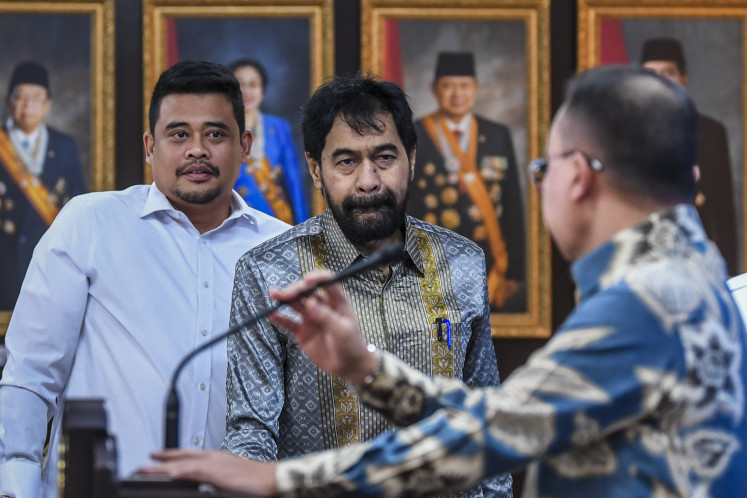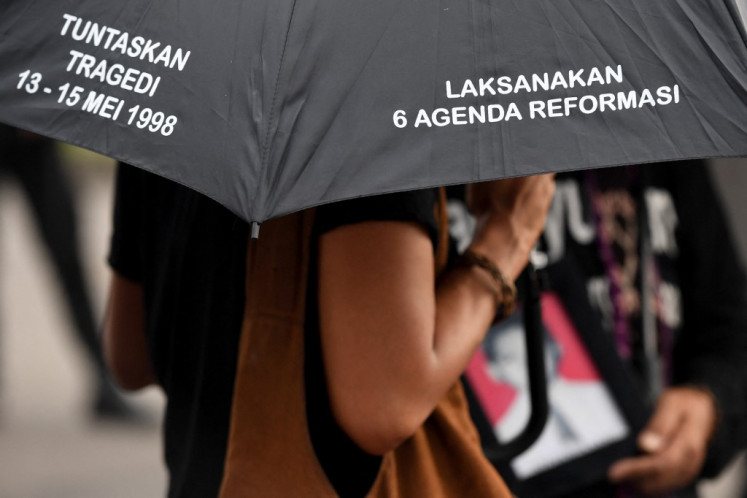Popular Reads
Top Results
Can't find what you're looking for?
View all search resultsPopular Reads
Top Results
Can't find what you're looking for?
View all search resultsPrivate sector steps up to boost domestic biogas use
The private sector is taking the initiative to boost the use of renewable energy biogas technology by providing technical assistance and financial aid to rural households and cattle farmers throughout the country
Change text size
Gift Premium Articles
to Anyone

T
he private sector is taking the initiative to boost the use of renewable energy biogas technology by providing technical assistance and financial aid to rural households and cattle farmers throughout the country.
'The eco-friendly biogas technology can help users to use less energy and save more money,' program manager for Indonesia Domestic Biogas division from House of Energy and HIVOS, Robert de Groot, said during the dedication of domestic biogas reactor funding on Monday.
He added that the biogas technology would allow households to process livestock waste, such as cow dung, into environmentally friendly gas, which could be used for domestic purposes such as cooking and lighting.
To produce biogas, the farmers needed to gather the livestock waste and insert it into a reactor, which would then produce ammonia gas that is channeled through pipes into houses, he said.
He added that Indonesia was a great potential market for biogas but lack of awareness among households and farmers hindered the development of the renewable energy.
'Most households and farmers are still thinking that it would be better for them to use their money for buying cows rather than investing in biogas,' he said.
The Bandung Institute of Technology (ITB) launched the country's first trial of biogas technology in the 1970s.
According to a 2009 report from SNV Netherlands Development Organization, the first biogas technology found in Indonesia consisted of two metal oil drums, which functioned as processor and gas holder.
In 1981, the government stepped in to construct free fixed biogas plants in some provinces with the financial support of the Food and Agriculture Organization (FAO). The report revealed that the project was not successful due to technical problems.
'Maintenance and poor equipment were the primary problems in the many failed biogas projects. Since it was free, villagers were less willing to take charge of the biogas facilities,' he said.
Robert said that despite the failure, many private companies and also non-profit organizations still showed interest in investing in domestic biogas technology, making it more commercial and market-oriented.
In 2009, a Dutch non-governmental non-profit development organization Hivos and the Ministry of Energy and Mineral Resources joined hands to develop biogas technology in Indonesia with a micro finance scheme under the Indonesian Domestic Biogas Program known as BIRU.
'We have targeted building 10,000 domestic biogas reactors nationwide,' he said, adding that so far biogas had been developed in nine provinces in Indonesia, such as West Java, East Java, Bali and South Sulawesi.
To accomplish the goal, Bank Syariah Mandiri (BSM), along with United Nations Environment Program (UNEP), has stepped in to collaborate under the BIRU project by providing microcredit loans for poor households.
'Under this program, farmers can save more money on energy as they now pay smaller installments on the equipment,' he said.
He cited a case in East Java where farmers only needed to pay monthly installment of Rp. 126,000. The price is less than previously due to the micro finance scheme. (tam)








